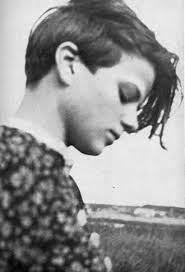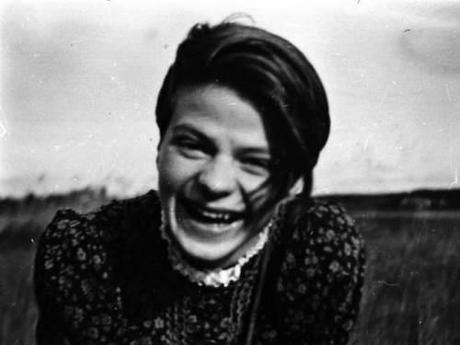
Sophie Scholl (1921-1943), photograph by Werner Scholl (1922-1944).
‘Stand up for what you believe in even if you are standing alone’ — Sophie Scholl.
Starting a new writing project is always exciting and especially so when you’re writing about something close to your heart and that you’ve wanted to explore in depth for a really long time. So it is with my latest project, which is a young adult novel about the German World War II heroine Sophie Scholl and the White Rose movement.
I must admit that I totally underestimated just how intense this project was going to be and would perhaps not have undertaken it had I known how overwhelmed I would feel once I started my research. The simple truth is that I had initially anticipated this book to be a straightforward tale of youthful heroism with a tragic outcome but it turns out that the true story is so much more complicated, dark and, ultimately, moving than that.

Sophie Scholl, photograph by Werner Scholl.
Yes, there is heroism but there’s so much more to Sophie and the White Rose than that. I was surprised to read that most of the young people involved, including Sophie and her siblings were enthusiastic members of organisations like Hitler’s Youth and its female equivalent, the League of German Girls before they realised just how damaging the ideas espoused by Nazis were. I was also surprised to learn that both of Sophie’s brothers, their fellow male students and also her boyfriend, Fritz Hartnagel (who would later marry her elder sister Elisabeth, who is the sole surviving Scholl sibling), all served in the German army – either as part of national service or, in the case of Fritz, as an officer in the Wehrmacht – something that would cause friction between he and Sophie until he gradually found his views changing.
I suppose it is this glimpse of what it was like to be a young man opposed to the Nazi party but still obliged to fight in the Germany army that I am finding most interesting right now. Of course I can’t claim that my book will be in any way as wonderful as the likes of All Quiet on the Western Front, but I am hoping that it will serve on some level as a look at what life was like for ordinary German young people during the Third Reich.

Sophie Scholl with her younger brother Werner Scholl.
It’s also completely transformed my way of thinking about the German army – after all, like most people I have been encouraged by Hollywood films, epic drama series like Band of Brothers and games like Call of Duty to regard the Wehrmacht as an inhuman multitude of faceless evil. They are the enemy and we are encouraged to watch them die, to revel in their destruction, to enjoy killing them, to want to wipe them all out. I just can’t feel that way any more – I still hate the Nazis and everything they did, but the Wehrmacht isn’t a faceless mass any more and I suppose it’ll be always in my mind now to wonder just how many were there simply because they had to be and not because it’s what they wanted to do – how many of them were like Sophie’s sensitive, quiet, artistic (he was a talented photographer, responsible for most of the haunting photos now so familiar of Sophie) younger brother Werner, who shared her ideals (and as a teenager climbed to the top of the local law courts and placed a blindfold decorated with a swastika over the eyes of the statue of Justice in protest against the regime) but would end up missing in action in Russia at the age of just twenty two, never to be seen or heard from again.

Willi Graf (1918-1943).
I think that I’m especially moved by the story of the White Rose member Willi Graf, a quiet, dignified, intelligent man, who (despite looking like the perfect ‘Aryan’ ideal) disapproved so strongly of the Nazi regime that he struck the names of every single one of his friends who joined the Hitler Youth out in his address book and never spoke to them again – this didn’t stop him being conscripted into the army as a medic in 1940, after which he saw for himself the horrors of the Warsaw Ghetto and was even decorated for his actions as ‘an intrepid medic who never thought about his own safety’. After his arrest in February 1943, he would spend six months in solitary confinement by the Gestapo, undergoing their interrogations but refusing to incriminate anyone other than himself in the (sadly false) hope that it would save his friends.
I’ll admit right now that writing this book is much more difficult than I expected it to be but at the same time, it already definitely feels like the most important thing that I have ever written. I suppose that when your subject matter haunts your dreams at night and virtually every waking moment and the research material has a tendency to reduce you to tears then it’s clear that there is something here that really needs to be said, no matter how difficult and emotionally draining I find the process of saying it.

Sophie Scholl, photograph by Werner Scholl.
It’s daunting too, to be writing a book from the perspective of someone who wrote copious letters and kept a journal during their all too short life. However, I have to constantly remind myself that I’m primarily writing for a young English speaking audience, many of whom will not have enough German to be able to read Sophie’s words for themselves or will find it tricky to get hold of the few English translations. I’ve been working on my German for this project (I have a GCSE in it but stopped after that) and have had to resort to reading French translations of her letters until my German is up to speed enough to be able to tackle the originals.
Anyway, that’s what I’m working on at the moment. It’s a true labor of love – a story of immense courage, self sacrifice, hope and love told from the point of view of an apparently ordinary middle class young woman of astonishing principles, intelligence, firmness of purpose and integrity who happened to be living in Third Reich Germany.

Hans Scholl (1918-1943), Sophie Scholl (1921-1943), Alexander Schmorell (1917-1943) – the photograph was taken on the day that Hans and Alexander departed to the Eastern Front to work as student-medics in the German army. Sophie was there to wave them off.
God bless you Sophie, Hans, Christophe, Werner, Willi, Alex, Kurt and everyone else involved with the White Rose. Never forget.
******
‘Frothy, light hearted, gorgeous. The perfect summer read.’ Minette, my young adult novel of 17th century posh doom and intrigue is now £2.02 from Amazon UK and $2.99 from Amazon US.
Blood Sisters, my novel of posh doom and iniquity during the French Revolution is just a fiver (offer is UK only sorry!) right now! Just use the clicky box on my blog sidebar to order your copy!
Follow me on Instagram.
